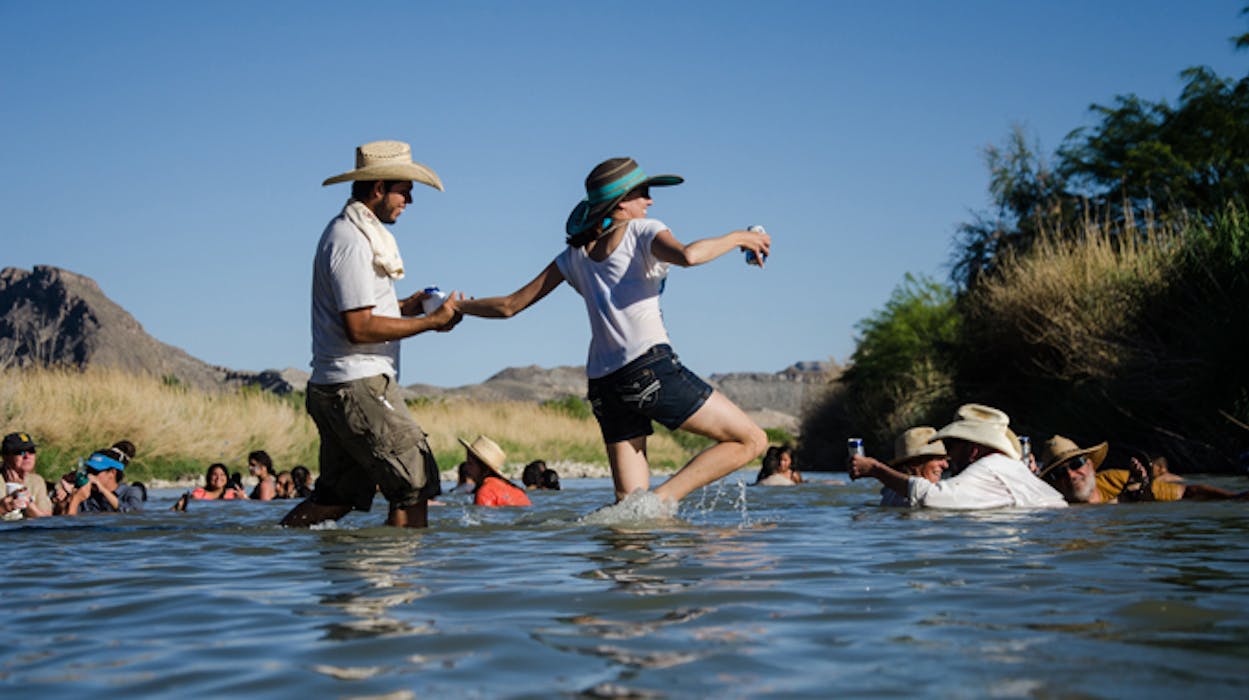Hundreds of people gathered recently along the banks of the Rio Grande for the second Voices From Both Sides festival held along the edge of Lajitas, Texas, and Paso Lajitas, in the Mexican state of Chihuahua.
On the American side, three Border Patrol vehicles watched from an overpass as festivalgoers waded back and forth through the thigh-deep water, crossing an international border.
“What’s happening here may be technically illegal,” said the Brewster County sheriff, Ronny Dodson, who did not seem inclined to interfere. “It’s just a friendship deal.”
The celebration reunited the unincorporated Texas town of Lajitas (its population is less than 100) with its even smaller Mexican neighbor. For decades the American and Mexican towns enjoyed an easy interdependence. That changed after the terrorist attacks on September 11, 2001, when the American government tightened border security. Over Mother’s Day weekend in May of 2002, Border Patrol agents detained about twenty people in Lajitas on immigration charges, signaling that unauthorized passage across the river would no longer be allowed. Families with members on both sides of the river were effectively separated; before long, businesses in Paso Lajitas catering to Americans closed.
In 2013, after more than a decade of strict border enforcement, Jeff Haislip and Collie Ryan, residents of Terlingua, another small Texas town ten miles farther east along the Rio Grande, wanted to host a Mother’s Day protest. But then they decided that a party would be more fitting.
“We didn’t just want to protest the border being closed, we wanted to show all the wonderful things that were lost when it was,” Haislip said. And so they began planning Voices From Both Sides as an international “fiesta protesta.”
Haislip and Ryan joined the leaders of Paso Lajitas and San Carlos, a larger Mexican town fifteen miles south of the Rio Grande, in organizing the effort.
“We want to show the importance of opening this passage, for cultural and economic reasons,” the mayor of San Carlos, Benjamin Ortiz, said through a translator.
For decades, the Paso Lajitas crossing, used by a range of people, from Comanches to nineteenth-century quicksilver miners to tourists, was one of several “unpatrolled ports of entry” in this rugged, sparsely populated Big Bend region of Texas. In the nineties, that designation was removed, but unofficial border crossings persisted, tacitly permitted by local and federal authorities. Lee Penland, chief of the Big Bend Valley Volunteer Fire Department, recalled exploring Paso Lajitas during fishing expeditions with his children during the nineties. “You could just come and go. There never were any problems,” Penland said.
Two decades ago, Paso Lajitas was home to about twenty families and several tourist-supported eateries, a store and a few informal guide outfitters. Visitors from the United States would cross to eat tacos at a riverside restaurant. Residents of the Mexican towns would buy laundry soap in American stores or visit American doctors. Throughout the nineties, some Paso Lajitas children even attended school in Terlingua.
“We’ve always been dependent on our neighbors, because we’re so isolated,” said Ryan, who lived along the Rio Grande for 23 years, before moving to Terlingua.
When the crossing closed in 2002, Paso Lajitas struggled; only a couple of families still live there and the restaurants all closed, Ryan said. Yadi and Yari Hernandez, two high school-aged sisters from Terlingua, said they saw their cousins in San Carlos only once a year; although the town is just sixteen miles from the border, the legally sanctioned way to get there involves a circuitous 150-mile trip over rough roads.
Voices From Both Sides enabled reunions like those between the Hernandez sisters and their cousins. Volunteers set up shade tents on either side of the river and local musicians played border-inspired songs.
During last year’s inaugural event, attendees were initially shy about wading forty feet across the river. “The dogs were the ones that broke the ice,” Haislip said.
This year, festivalgoers were less hesitant. After a bilingual Mother’s Day service, the river filled with young people tossing Frisbees and older couples steadying each other as they crossed the rocky riverbed. A man in a blue polo shirt clutched a bouquet of flowers as he waded to Mexico, where he presented them to a beaming older woman.
One Presidio resident, Matt Moore, waded across to enjoy the free tacos in Mexico, but his wife, Maria, stayed on American soil. “I’m a resident alien, and I don’t want to push my luck,” she said, laughing.
On the American shore, Anita Goss, a Lajitas resident, circulated a petition requesting a reinstated foot crossing at Lajitas.
Whether Voices From Both Sides will encourage a more porous border or merely remain an annual exception tolerated by the Border Patrol, attendees were generally optimistic and took hope in the story of Boquillas, a similar rural crossing 67 miles away in Big Bend National Park. Also closed in 2002, it reopened to those with documents last year as a new, high-tech crossing with a phone and video camera that connects to agents in El Paso.
“We’re one neighborhood in two countries,” Ryan said. “For one half to have prosperity and the other half to be locked out of it is unjust.”






